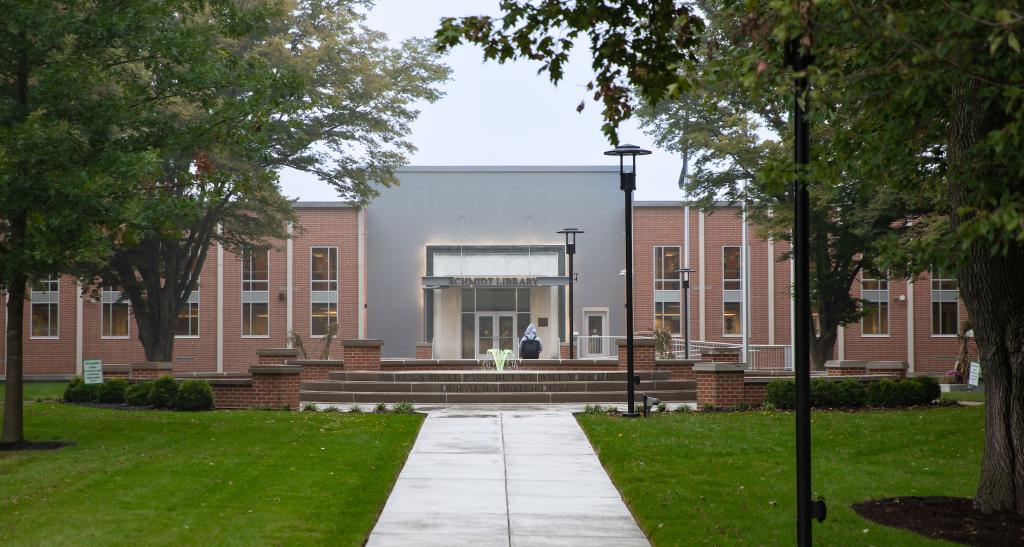At York College, the Pre-Law Studies pathway provides personalized guidance and resources for students who are interested in attending law school after earning their undergraduate degree. In alignment with the American Bar Association (ABA), we recognize that successful legal professionals come from diverse backgrounds and a variety of perspectives. For that reason, “the ABA does not recommend any undergraduate majors or group of courses to prepare for a legal education” and York College of Pennsylvania provides Pre-Law Advising to students from any academic major.

Develop skills that will support legal career success.
With support from York’s Pre-Law Advisory Committee and Career Development Center, YCP graduates have been accepted at more than 50 law schools across the country. Our faculty include experienced professionals who are trained and licensed in law. You’ll have their mentorship on your side as you navigate course selection, LSAT preparation, researching law schools, and submitting your law school applications.
About the Pre-Law Program at York College
Pre-Law Curriculum Recommendations
While the American Bar Association does not endorse any specific undergraduate major or curriculum for a pre-law degree, law schools expect successful applicants to display a high level of proficiency in core skills like communication, problem-solving, critical thinking,and research. As you earn your bachelor’s degree, you’ll want to take courses that help you to develop these skills — and build a transcript that showcases your experience in those areas.
As you work with your Pre-Law advisor to develop a plan for your undergraduate curriculum, some of the courses you'll take may include:
- PHL 222: Critical Thinking
- BUS 260: Legal Environment of Business
- WRT 305: Rhetorical Theory
- CM 327: Persuasion
- PS 327: Environmental Law
- PS 317: Principles of Law
- CCJ 336: Judicial Process
- PS 357: Health Law and Policy
- PS 371/HIS 371: American Constitutionalism I: Structures of Government
- PS 372/HIS 372: American Constitutionalism II: Civil Rights and Liberties
- MGT 420: Employment Law
- SPM 425: Legal Aspects of Sport
Minor in Legal Studies
The Legal Studies minor is designed for students who are interested in understanding the role of law in society. This minor program provides a solid foundation for those preparing for careers in law and is an excellent option for students who wish to continue their graduate education in law school or a related field.
To fulfill the requirements of the Legal Studies minor, you must take 18 credits, including one core course (PS 317: Principles of Law) and five elective courses. A full list of requirements is available in your Academic Catalog.
Join the Pre-Law Studies Advising Program
Students who are interested in Pre-Law Studies should submit their information to the Pre-Law Interest Group. This group ensures that students with a Pre-Law focus receive important updates about workshops, events, services, and resources available to assist you with the law school application process.
Prepare for a Career in Law or a Related Field
Pre-Law Studies prepare you to pursue law school and, ultimately, a career as a lawyer. However, a number of alternate career paths are also available to those with a background in law. Understanding the legal system and policies, being able to read and critically consider contracts and other documents, and knowing how to advocate for yourself or your client — these are all valuable skills in a wide variety of industries.
Students who pursue a pre-law program may further tailor their education through their declared major or minor, elective courses, or pursuing a graduate law degree after earning their undergraduate diploma. You may consider careers like:
- Attorney
- Paralegal
- Environmental advocate
- Health advocate
- Diversity specialist
- Human resources manager
- Policy analyst
- Public manager
- County/school solicitor
- Public affairs officer
- Civil Service
- Educator
Leverage Your Undergraduate Degree Experience While Applying to Law School
The law school application process requires intentional planning — from skill-building throughout your first two years of undergraduate study, to graduate school research, taking the LSAT, résumé-writing, and application submission during your junior and senior years. As a participant in York College’s Pre-Law Studies advising program, you’ll have help every step of the way.
Pre-Law coursework can be integrated into the major of your choice, with guidance from faculty advisors who have years of experience navigating law school academic requirements.
York College alumni have been accepted at more than 50 law schools since 2017. While students with a wide variety of undergraduate majors may be admitted to law school, some of the most common majors for Pre-Law students at YCP include:
Law Firm Internships and Building Your Law School Résumé
While an internship is not required, many law schools value previous work experience in the field. Internships also allow you to gain firsthand knowledge of the legal profession and help to establish a professional network that can benefit you throughout your career. Students in the Pre-Law Studies program may have the opportunity to intern with local law firms in York and neighboring areas, depending on position availability and the employer’s desired qualifications.
The Career Development Center at York College helps Pre-Law students to prepare application materials for both law school applications and potential jobs or internships. Our Career Development professionals can assist you with:
- Reviewing personal statements
- Résumé writing
- Credential Assembly Service (CAS) guidance
- Access to PreLaw magazine
- Law school information sessions
- Pre-law interest group emails featuring important information, events, and opportunities.
Personalized Pre-Law Advising
Faculty on the Pre-Law Advisory Committee get to know their students one-on-one and take an active interest in helping you reach your goals. Along with professionals in the Career Development Center, they’ll keep you informed about upcoming law school deadlines and events, share valuable resources, offer advice on LSAT preparation, and counsel you on course registration to ensure a class schedule that positions you for success.
Join the Pre-Law Society at York College
The Pre-Law Society is a student-run organization dedicated to creating a support system among students who are interested in a career in law. The organization is open to all majors and provides a link between law school hopefuls and the advisors who can assist them in achieving their professional goals.
Core Skills for Lawyers and Other Legal Careers
The Pre-Law Studies program focuses on preparing students not only for law school, but for careers in law. Whether you want to become an attorney or plan to pursue a different career within the legal field, a foundational skill set can equip you for success in your role. Your Pre-Law advisors will support you along an educational pathway that helps you develop skills like:
- Critical reading and analysis
- Problem-solving
- Writing
- Communication
- Research and information literacy
- Collaboration
- Familiarity with legal frameworks and the law
Minors for Pre-Law Studies
The Legal Studies minor is an ideal complement to most academic majors for students who are exploring legal careers and applying to law school. However, it is not a requirement for Pre-Law Studies and students may wish to pursue other minor programs. Minors of interest may include:
Frequently Asked Questions
While some schools will offer a dedicated pre-law bachelor’s degree, the more common path for those interested in a legal career — and the path recommended by the American Bar Association (ABA) — involves earning an undergraduate degree in nearly any academic discipline. The ABA encourages prospective law school students to “pursue an area of study that interests and challenges you, while taking advantage of opportunities to develop your research and writing skills.”
The Pre-Law Studies program at York College is not a major, but rather a dedicated advising track that supports students of any major as they prepare for law school. A team of law school-savvy advisors is available to assist with course selections that will help build a desirable skill set for future legal professionals, as well as preparation for the LSAT and law school applications. Pre-Law Studies offers a pathway through which students graduate with a comprehensive bachelor’s degree in their field of choice, while ensuring they have all the resources they need to succeed in the next phase of their legal education.
There is no single major that will prepare you best for law school, or that is favored by law school admissions teams. You have many options, and can tailor your education to your personal interests and goals. That said, you’ll want to ensure that your coursework helps you to strengthen core skills required in the legal field, such as writing, research, communication, and critical thinking. Some of the most common majors for Pre-Law students at York College include:
Many Pre-Law students also choose to complement their major with a minor in Legal Studies, which is specially designed to hone skills that benefit law school applicants.
The LSAT is a half-day standardized test administered four times each year at designated testing sites in the United States and around the world. All law schools approved by the American Bar Association require applicants to take the LSAT as part of their admission process. The test consists of five 35-minute sections of multiple-choice questions, as well as a 35-minute writing sample. The writing sample is not scored, but copies of the writing samples are sent to all law schools to which the student applies. The LSAT examines three broad skill sets:
- Reading Comprehension
- Analytical Reasoning
- Logical Reasoning
York College’s Pre-Law Advisory Committee includes faculty members who understand the expectations of law school admissions staff and the requirements of a career in law. The Committee includes:


